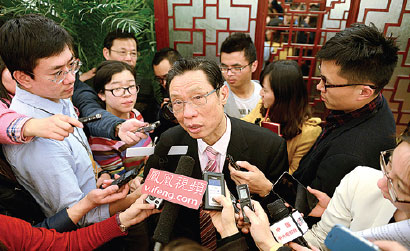Smog could be beaten in 10 years
|
Zhong Nanshan, a renowned respiratory expert specializing in pandemics and an NPC deputy, is interviewed on the sideline of the third session of the 12th National People's Congress in Beijing on Thursday. Wei Xiaohao / China Daily |
It might take China a decade to tackle its notorious smog problem, said Zhong Nanshan, a deputy of the National People's Congress and a renowned respiratory expert specializing in pandemics.
"Some experts said China might have to spend 30 years to fight the haze, like the lessons of London's Great Smog in 1952, but joint efforts nationwide might cut the time to 10 years," said Zhong at a news conference on Thursday in Beijing.
"A fresh breath of air requires both favorable meteorological conditions and nationwide effort."
According to research by Peking University on the improvement of air conditions during the 2008 Beijing Olympics, the shutdown of polluting plants and banning of vehicles with excessive emissions during the Games reduced air pollution by 30 percent and PM2.5, particulate matter with a diameter smaller than 2.5 microns, by 55 percent, said Zhong.
Residents' heart rates also decreased while the function of blood platelets improved and blood pressure lowered, he said.
"This proves that China could have blue skies," said Zhong.
Another proof was that Beijing was free of smog during the APEC meetings as emission-heavy production was halted and half of the cars across the capital were kept off the roads.
"I was in Beijing during the APEC meeting and I was reminded of some 60 years ago, when I first came to Beijing to study in 1955," said Zhong.
"Beijing was free of smog or any haze back then, thanks to fewer vehicles discharging pollutants."
Zhong said that to improve air conditions nationwide, China should cut down on the consumption of coal, use better quality fuel and find less-polluting methods for companies.

























